DPC
JISC Digitisation Programme: Preservation Study
A DPC led consortium of the ULCC and Portico, undertook a study on behalf of JISC to review the preservation of the JISC Phase 2 digitisation programme. The successful proposal is available here.
DPC successful proposal (PDF 362KB)
A project blog is available at http://digipressurvey.jiscinvolve.org/
Case Studies
- Freeze frame [PDF 642KB]
- Archival Sound Recordings [PDF 699KB]
- Cabinet Papers
- Wels Jourmals
Missing Links: the Enduring Web
JISC, the DPC and the UK Web Archiving Consortium Workshop
Venue: The British Library Conference Centre, London
- Full Conference Report [PDF 337KB]
- Presentations from the conference (see below)
- Conference report from Peter Webster and Jane Winters, Institute for Historical Research (external website)
- Conference report from Alexandra Eveleigh, West Yorkshire Archive Service (Ariadne)
- Conference report from Jonathan Clark's Blog
- Conference report from Marieke Guy
The web runs at risk. Our generation has witnessed a revolution in human communications on a trajectory with the origins of the written word and language itself. Early web pages have an historical importance with prehistoric cave paintings or proto-historic pressed clay ciphers. They are just as fragile. The ease of creation, editing and revising gives content a flexible immediacy: ensuring that sources are up to date and, with appropriate concern for interoperability, content can be folded seamlessly into any number of presentation layers. How can we carve a legacy from such complexity and volatility?
Key issues for long-term access and preservation remain unresolved. How can content creators make sure their creations are durable without impairing their flexibility? How does web-archiving relate to data-curation and traditional archiving? What constitutes an appropriate legacy from a web site? What audiences should web archives anticipate and what does this mean for selection, ingest and preservation? What will the web be like as an historical source, and what use will be made of archived web sites by future generations? How will they validate them? How will they cite them? What are our missing links? How can these be filled?
The challenges of web archiving have long been recognised and there are a number of tools and services that already offer – or purport to offer – long-term access to web content. But gaps remain in policy, expertise and implementation and the tools for web-harvesting need a clearer link between the technical needs of preservation services and the deferred needs of user communities.
Only by developing and strengthening the links between content creators, tools developers, preservation services and users can we hope to secure an enduring web.
Sponsored by the Digital Preservation Coalition (DPC) and the Joint Information Systems Committee (JISC) the six partners of the UK Web Archiving Consortium (British Library, National Library of Wales, JISC, Wellcome Library, The National Archives and the National Library of Scotland) are organising a joint workshop on the 21st July 2009 at the British Library Conference Centre, Euston Road, London.
This event will bring together key stakeholders – archive managers, preservation experts, national libraries, web archivists and content providers - for practical and focussed discussion on shared perspectives, requirements, problems and solutions. Formal presentations and case studies will be presented with an opportunity for posters and demonstrations of tools. The day will close with a plenary discussion and a follow up Report.
Who should come?
- Web editors and web site managers
- Web archivists
- Archive managers
- Digital preservation and curation specialists
- Researchers interested in the web as an historical resource
- Librarians and policy makers with interests in electronic legal deposit
Why should you come?
- Help to shape the UK’s web archiving agenda
- Learn from organisations currently preserving websites
- Share your preservation concerns and aspirations
- Understand new services and projects working in web archiving
- Anticipate the evolution of a rapidly changing field
- Contribute your web archiving expertise to the repository community
Programme
|
0900-09:30 |
Registration |
|
0930-09:40 |
Welcome & introduction |
|
Session 1: Setting the scene |
|
|
09:40-10:20 |
Keynote & questions [PDF 2.37MB] |
|
10:20-10:40 |
Web Archive and Citation Repository in One: DACHS [PDF 1.33MB] |
|
10:40-11.00 |
The future of researching the past of the Internet [PDF 7.02MB] |
|
11.00-11.30 |
Morning coffee break |
|
Session 2: Creation, capture & collection |
|
|
11.30-11.50 |
Web Archiving Tools: An Overview [PDF 554KB] |
|
11.50-12.10 |
Context and content: Delivering Coordinated UK Web Archive to User Communities [PDF 2.03MB] |
|
12.10-12.30 |
Capture and Continuity: Broken links and the UK Central Government Web Presence [PDF 1.45MB] |
|
12.30-12.45 |
Questions and discussion |
|
12.45-13.30 |
Lunch break and exhibition |
|
Session 3: Issues and approaches to long term preservation of web archives |
|
|
13.30-13.50 |
Diamonds in the Rough: Capturing and Preserving Online Content from Blogs [PDF 2.07MB] |
|
13.50-14.10 |
Beyond Harvest: Long Term Preservation of the UK Web Archive [PDF 577KB] |
|
14.10-14.30 |
From Web Page to Living Web Archive [PDF 9.55MB] |
|
14.30-14.50 |
Emulating access to the web 1.0 [PDF 3.05MB] |
|
14.50-15.00 |
Questions |
|
15.00-15.15 |
Afternoon tea break |
|
Session 4: Discussion and next steps |
|
|
15.15 – 15.40 |
What we want with web-archives; will we win? [PDF 1.07MB] |
|
15.40-16.40 |
Roundtable – all speakers in question time format |
|
16.40 - 16.45 |
Thanks and close |
Photographs
These photos are only a selection and are relatively low resolution: a full set and higher resolutions are available.
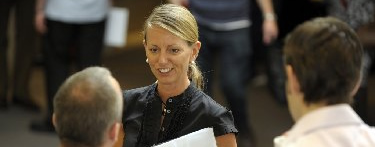
Carol Jackson, DPC
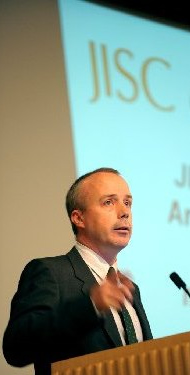
Neil Grindley, JISC
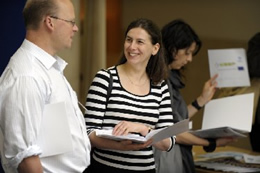
Registration
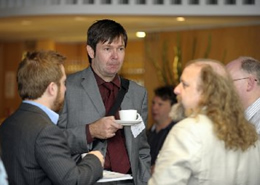
Richard Davis, ULCC
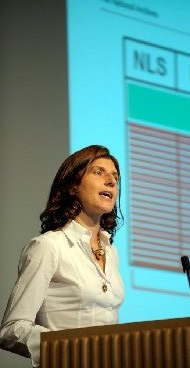
Cathy Smith, TNA
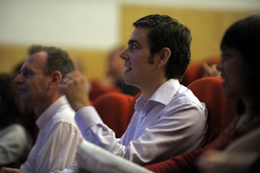
Jeffrey Van Der Hoeven, KB
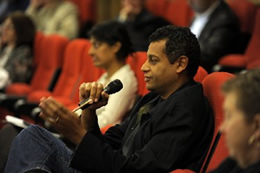
Question and Answer
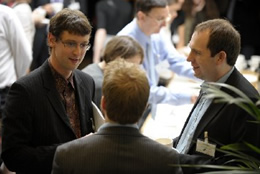
Discussion
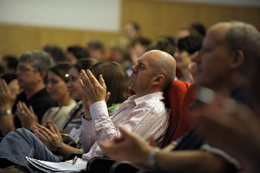
Question and Answer
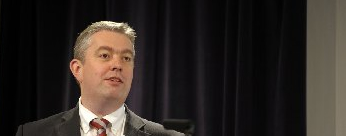
William Kilbride, DPC
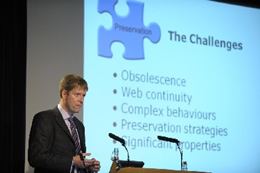
Adrian Brown, Parliamentary Archives

Audience
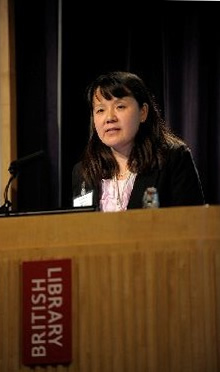
Helen Hockx-Yu, BL
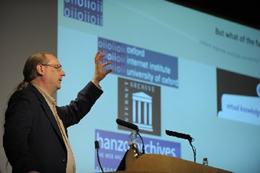
Eric Meyer, Oxford University
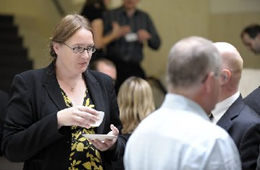
Maureen Pennock, BL
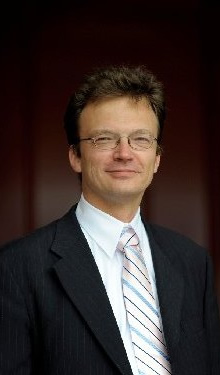
Thomas Risse, L3S Research Center
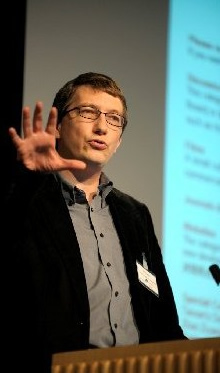
Hanno Lecher, Leiden University
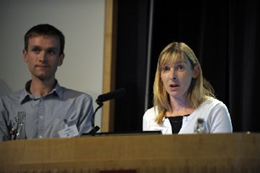
Amanda Spencer and Thomas Storrar, TNA
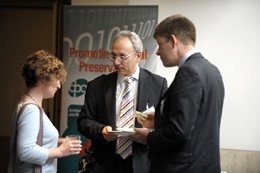
Discussion
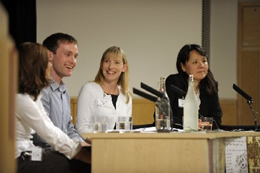
Question and Answer

Discussion
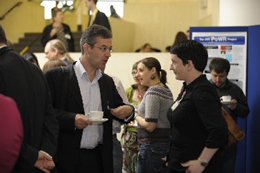
Discussion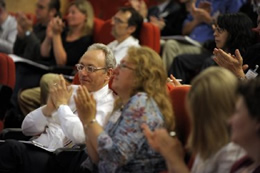
Audience
Conference Report: Curating Research: e-Merging New Roles and Responsibilities in the European Landscape
17 April 2009, The Hague, Koninklijke Bibliotheek, The Netherlands
1. Summary of issues relevant for DPC members
- Training is popular but what sort of training will be most effective: what will drive down costs and support our work best?
- Considerations of scale: what is the right size solution to our digital preservation challenges? Do we want lots of small DP facilities or a small number of large ones?
- How do we collaborate without undermining institutions?
- There would appear to be a lot of policy development which is an important change from a decade ago: but how do we assess the value of these emerging policies and how do we know if they are being applied?
- There is still a policy gap. There are some high level aspirations in the UNESCO Charter and some very detailed guides, but a gap in between. What would be our
- golden rules for creating digital data?
Tackling the Preservation Challenge: Practical Steps for Repository Managers
DPC/RSP/DCC/JISC Workshop![]()
![]()
![]()
![]()
A podcast from this event is available to download from:
http://www.rsp.ac.uk/podcasts/preservation.php
Speakers at the event tell us about practical tools and services to help repositories. Featuring contributions by Frances Boyle, Neil Beagrie, Barbara Sierman, Chris Awre, David Tarrant, Chris Yates, Rory McLeod, Adrian Brown, Kevin Ashley and Matthew Woollard.
We all know that preservation of repository content is vital -- but we also know that in practical terms it remains largely unresolved. What should we be doing right now to embed preservation into the working practice of repositories? Who should we be talking to?
Are there tools and services out there which can support repository managers in their work today? Are preservation experts and services tuned into the practical workflow requirements of their repository manager colleagues? If this has any resonance then this event is for you!
The Digital Preservation Coalition (DPC), the Repositories Support Project (RSP), the Digital Curation Centre (DCC) and the JISC are organising a joint workshop on the 12th December at the Novotel Hotel, Euston, London. The intention is to bring together key stakeholders, the repository managers and preservation experts, at a practical focussed event to talk together and share perspectives, requirements, problems and solutions. It is hoped that the workshop will lead to collective recommendations for what the next moves for repository managers and preservation specialists should be to provide practical focussed support, services and tools. The workshop should in addition further repository managers’ understanding of how to implement preservation strategies and processes.
As well as the formal presentations there will also be a marketplace when there will be an opportunity to view posters, and engage with project teams and see demonstrations of the latest tools. The day will close with a participative discussion session.
Prior to the event the organisers shall gather concerns and requirements from repository managers and preservation experts/services and synthesise these into 'Top 5 Concerns', 'Top 5 Wishes' and 'Top 5 Solutions' (for practical implementation). These will then be collated to form the basis for the panel discussion.
Who should attend?
Repository managers, librarians, archivists, digital preservation experts, information management specialists, service providers.
Benefits of attendance
- An opportunity to share your preservations issues, (concerns, wishes, solutions) with peers and experts.
- To gain insight from repository managers on how they are approaching preservation on different platforms.
- To get up to speed with the outcomes from the extant services and projects working in this important area.
- To gain some tips from fellow practitioners on what works for them.
- To share your digital preservation expertise with the repository community
REGISTRATION NOW CLOSED
Programme
|
Chair: Dr. Les Carr, Director of EPrint Services, University of Southampton |
|
|
09:30 ‑ 09:55 |
Registration and Coffee |
|
09:55 - 10.00 |
Welcome and Introduction |
|
10:00 - 10:30 |
Keynote Presentation – The Importance of Digital Preservation [PDF 81KB] |
|
10:30 ‑ 11:00 |
Digital Preservation at the National Library of Netherlands (KB). Experiences from the Driver Project and E-Depot [PDF 406KB] |
|
11:00 - 11.15 |
Break and Coffee |
|
11.15 - 12.00 |
Market Place Projects and Demonstrations:
|
|
12:00 - 13:00 |
Case Studies: Fedora [PDF 942KB] |
|
13:00 - 14:00 |
Lunch |
|
14:00 - 14:20 |
LIFE2 [PDF 1.0MB] |
|
14:20 - 15:05 |
Service Providers: ULCC [PDF 1.6MB] |
|
15:05 - 15:20 |
Break and Coffee |
|
15:20 - 16:05 |
Panel Discussion led by Les Carr |
|
16:05 - 16:10 |
Closing Remarks |
Digital Preservation Planning: Principles, Examples and the Future with Planets
![]()

PLANETS and the Digital Preservation Coalition (DPC) will be holding a joint briefing day: Digital Preservation Planning: Principles, Examples and the Future with Planets, on the 29th of July 2008, at the British Library Conference Centre, St Pancras, London.
The event will be an informal and interactive workshop allowing attendees to share knowledge and experience in digital preservation planning, setting strategy and policy plus first-hand experience of Planets tools and technology.
Attendees will also hear from DPC members about the approaches they have used in their organisations and the outcomes. There will be plenty of opportunity to ask questions and for discussion.
Planning is crucial to the process of preserving digital information and data. Planets has taken preservation planning as its research focus. From mid 2010, Planets will deliver downloadable software to help organisations plan and execute preservation activities.
Benefits of attendance
- Understanding of aspects of preservation planning, policy and strategy setting
- Real-life insight into other organisations’ approaches to preservation planning
- Awareness of the range of services and tools Planets will deliver
- Hands-on experience of Plato, Planets’ preservation planning tool
- Insight into identifying the characteristics of digital objects
- Understanding of working in a testbed environment
- An opportunity to ask questions and for discussion
Who should attend?
The event will appeal to anyone involved at any stage in digital preservation policy, strategy and planning cycle. (e.g. librarians archivists, digital librarians and archivists, repository mangers, software developers, vendors, policy managers etc and others working in a wide range of settings).
Programme
|
Time |
||
|
9.00 |
Registration and coffee |
|
|
Morning Session Chair – Frances Boyle, DPC |
||
|
09.30 |
What's it all about? Scene Setting & Overview for the Day (PDF 406KB) |
Frances Boyle, DPC |
|
10.15 |
Andreas Rauber, Vienna University of Technology |
|
|
10.45 |
Constructing a Preservation Policy: the case of the UK Data Archive (PDF 378KB) |
Matthew Woollard, UKDA |
|
11.15 |
Break and Coffee |
|
|
11.30 |
Natalie Walters, Wellcome Library |
|
|
12.00 |
Preservation Planning (Part 1): Workflow and the Plato tool (PDF 2.2MB) |
Christoph Becker, Vienna University of Technology |
|
12:30 |
Lunch |
|
|
Afternoon Session Chair – Frances Boyle, DPC |
||
|
13:00 |
Preservation Planning (Part 2): Simulation and practical exercises |
Christoph Becker & Andreas Rauber, Vienna University of Technology |
|
14.10 |
Christoph Becker |
|
|
14.30 |
Manfred Thaller, University of Cologne |
|
|
15.00 |
Break and Coffee |
|
|
15.15 |
Matthew Barr, HATII, University of Glasgow |
|
|
16.15 |
Interactive discussion session |
Prof. Kevin Schürer, UKDA |
|
17.15 |
End |
|
Key to acronyms:
| PLANETS | Preservation and Long-term Access through NETworked Services |
| UKDA | UK Data Archive |
| HATII | Humanities advanced Technology and Information Institute, University of Glasgow |
Mind the Gap: Assessing Digital Preservation Needs in the UK
June 2008
The Review Board for the ITT 'Mind the Gap' - follow up study reviewed responses to the ITT in mid-June. Whilst the Review Board found much to commend in the proposals it was decided not to award a contract at this time. The brief will be re-scoped to focus on actions for which the DPC or its members can take responsibility for and it will have a strong practical and achievable focus.
The 'Mind the Gap' report was published with 21 recommendations aimed at a range of stakeholders. To gauge which of these are the most important to the DPC community, members were asked to participate in a survey to consider the final 'Mind the Gap' recommendations. They voted on which recommendations would impact on their work and deliver the greatest benefit to the digital preservation community if achieved successfully.
Mind the Gap
Added on 1 June 2008
Report reveals major gaps in long term management of valuable digital assets
15th February 2006
A 'state of the nation' report today reveals that less than 20% of UK organisations surveyed have a strategy in place to deal with the risk of loss or degradation to their digital resources - despite a very high level of awareness of the risks and potential economic penalties.
With the release today of the report, Mind the gap: assessing digital preservation needs in the UK, the Digital Preservation Coalition (DPC) aims to help government, public institutions and private companies turn high awareness into concerted action.
ICPSR become DPC Ally
Added on 30 April 2008
The Inter-University Consortium for Political and Social Research (ICPSR)
It gives me great pleasure to announce that The Inter-University Consortium for Political and Social Research (ICPSR) has become an allied organisation of the Digital Preservation Coalition (DPC).
The ICPSR (http://www.icpsr.umich.edu/ICPSR/) is, like the DPC a membership organisation. It encourages and facilitates research and instruction in the social sciences and related areas by acquiring, developing, archiving, and disseminating data and documentation relevant to a wide spectrum of disciplines, and by conducting related instructional programs.
Chris Rusbridge, a Digital Preservation Coalition Board Director, said:
What to preserve? Significant Properties of Digital Objects
![]()

Significant properties are essential characteristics of a digital object which must be preserved over time for the digital object to remain accessible and meaningful. Proper understanding of the significant properties of digital objects is critical to establish best practices and helps answer the fundamental question related to digital preservation: what to preserve?
The importance of significant properties has been highlighted by a number of notable digital preservation initiatives in recent years. These include a range of projects funded by the Joint Information Systems Committee (JISC) and the European Union, in which work has been undertaken to investigate the factors affecting decisions on significant properties, to establish generic models for determining them, to develop tools and services for describing and extracting them, or simply to understand complex digital object types, using the concept of significant properties as a starting point.
JISC, the British Library and the Digital Preservation Coalition (DPC) are organising a joint workshop on 7th April at the British Library Conference Centre. The intention is to bring together the relevant projects and report on progress to date.
To open PDFs you will need Adobe Reader Neil Grindley (JISC) Welcome and introduction |
 Keynote Speaker Andrew Wilson (NAA) Presentation PDF 199KB |
 Stephen Grace (CeRch) INSPECT Project Presentation PDF 1.3MB |
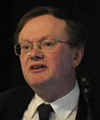 David Duce (OBU) JISC Study 1 - Vector Images Presentation PDF 1.6MB |
 Mike Stapleton, (SSL) JISC Study 2 - Moving Images Presentation PDF 561KB |
 Brian Matthews (STFC) JISC Study 3 - Software Presentation PDF 1.1MB |
 Richard Davis (ULCC) JISC Study 4 - e-Learning Objects Presentation PDF 1.0MB |
 Adrian Brown (PLANETS) Preservation Characterisation in PLANETS Presentation PDF 1.5MB |
 Roger Lloyd (Barclay Wealth) Industry / Media Presentation PDF 839KB |
 Colin Neilson (DCC) SCARP Project Presentation PDF 719KB |
 Stephen Rankin (on behalf of David Giaretta) (DCC) Digital Object Semantics Presentation PDF 453KB |
 Cal Lee (UNC Chapel Hill) SIGPROPS Presentation PDF 193KB |
 Andrew Wilson (NAA) Comments/summary |
 Chair, Chris Rusbridge (DCC) Discussion |
 Frances Boyle (DPC) Closing Remarks |
Key to acronyms:
| JISC | Joint Information Systems Committee |
| NAA | National Archives of Australia |
| CeRch | Centre for e-Research , King's College London (incorporating the Arts & Humanities Data Service) |
| OBU | Oxford Brookes University |
| SSL | System Simulation Ltd. |
| STFC | Science and Technologies Facilities Council |
| ULCC | University of London Computing Centre |
| PLANETS | Preservation and Long Term Access Through Networked Services |
| TBC | To be confirmed |
| DCC | Digital Curation Centre |
| UNC | University of North Carolina |
| DPC | Digital Preservation Coalition |
Photographs

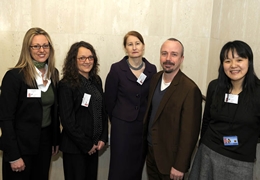
The Organisers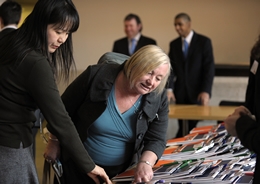
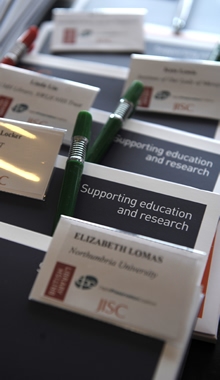
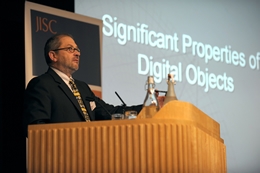
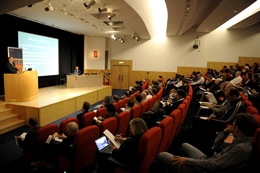
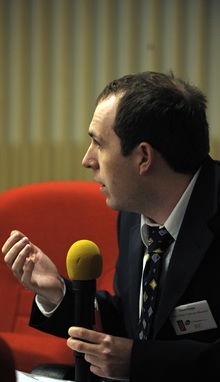

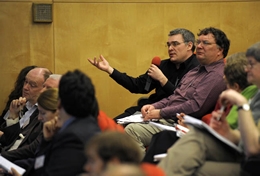


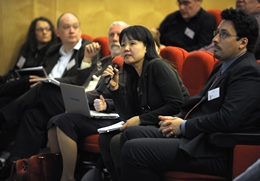
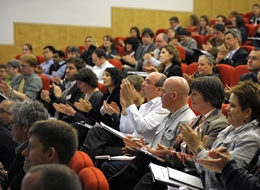

PDF should be used to preserve information for the future
Added on 1 April 2008
Good news the already popular PDF file format adopted by consumers and business alike is one of the most logical formats to preserve today's electronic information for tomorrow.
According to the latest report released today by the Digital Preservation Coalition (DPC), Portable Document Formats (PDF) is one of the best file formats to preserve electronic documents and ensure their survival for the future. This announcement will allow information officers to follow a standardised approach for preserving electronic documents.
Information management and long-term preservation are major issues facing consumers and businesses in the 21st Century. This report is one of a series where The Digital Preservation Coalition (DPC) aims to think about and address the challenges facing us.
Subcategories
Blog
Unless otherwise stated, content is shared under CC-BY-NC Licence































































































































